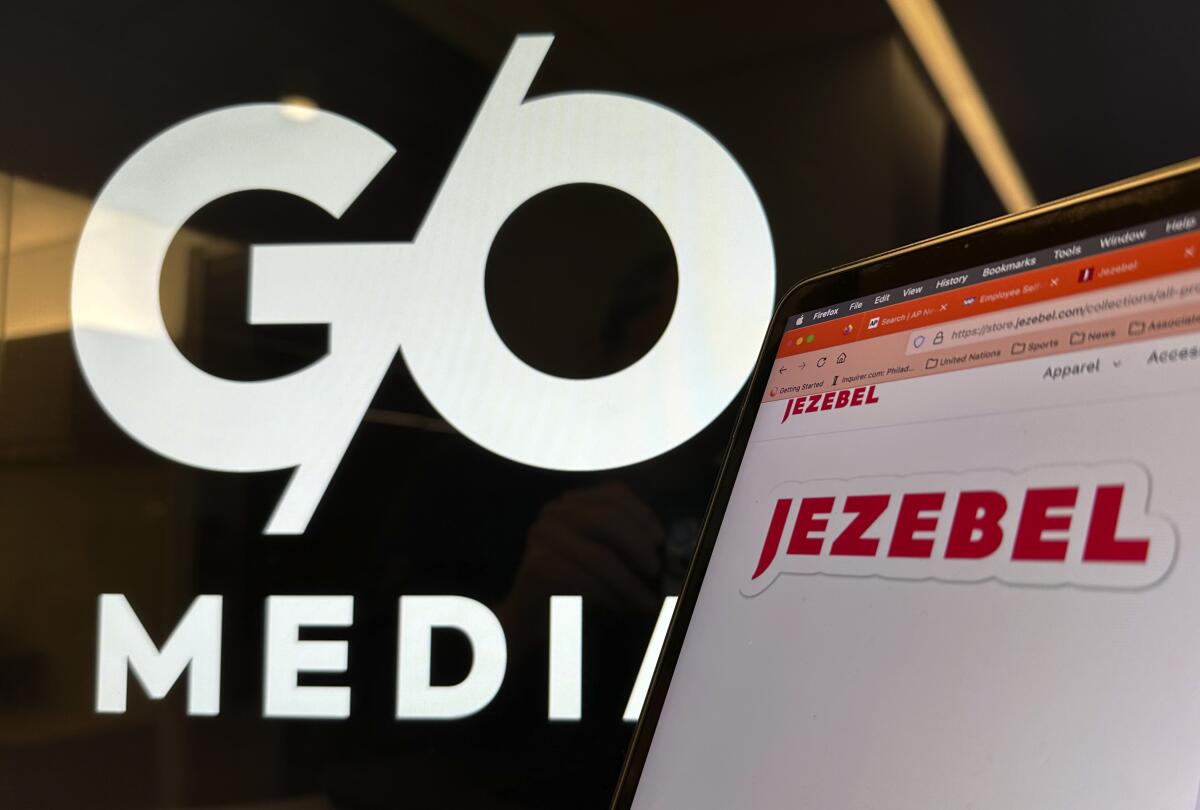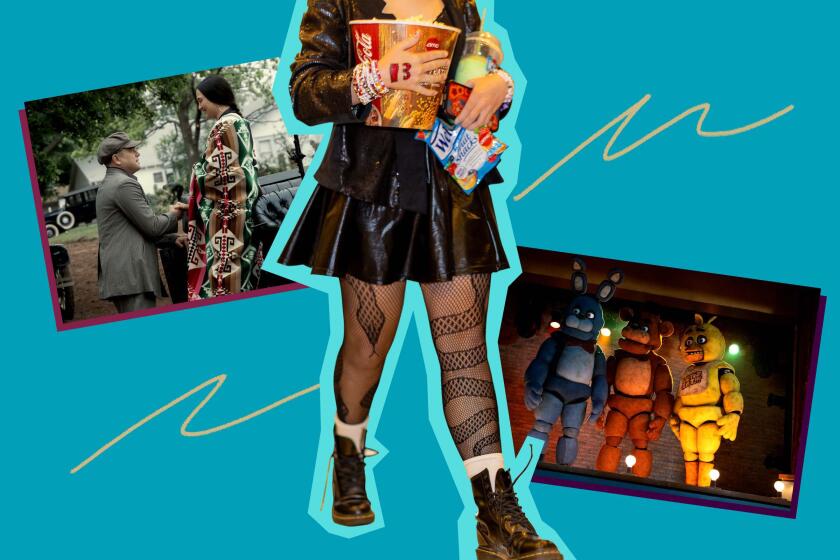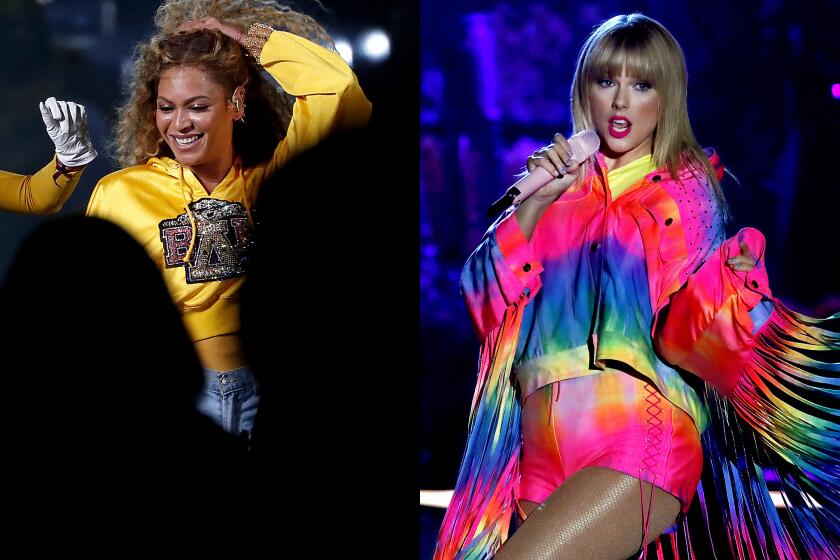Paste Magazine buys Jezebel, wants to ‘bring in Gen Z voices’ to revive the feminist site

- Share via
Weeks after it was shuttered, Jezebel is back.
Atlanta-based pop culture publication Paste Magazine has acquired the feminist news and opinion publication, with hopes of revamping the once-influential website.
And its professed target audience? Gen Z.
“I think of [Jezebel] as the quintessential site for millennial women who grew up on this, and it’s a site that taught them what they could be,” Josh Jackson, co-founder and editor in chief of Paste, told the New York Times, which was first to report the acquisition. “And I want the same for Gen Z, and to bring in Gen Z voices.”
Kate Dries, former editor at the groundbreaking women’s site Jezebel, reflects on what it meant for the culture and why its closure hurts.
The digital magazine confirmed the acquisition in a statement posted on its site, praising Jezebel for its “influential position in addressing contemporary issues.” News of the sale came after reports that several bidders had been circling the feminist site in recent weeks.
“Paste’s mission has always been to provide insightful, thought-provoking content that resonates with a diverse audience,” the statement said. “Jezebel’s unique voice and commitment to storytelling make it a perfect addition to our portfolio.”
While the contours of how Jackson and Paste will reshape Jezebel remain under wraps, the emphasis on Gen Z — commonly defined as those born between 1996 and the early 2010s — makes it the latest media company aiming to capitalize on and attract the eyeballs of very-online teens and 20-somethings.
Data show that the younger generation of viewers spends half of its waking hours on screen time. That’s good news and bad news.
Jezebel, founded in 2007 by Gawker Media, arrived at a time when blogs were a major way in which subcultures and communities formed and connected online. It found a home among predominantly female audiences and grew into a leading voice on hot-button issues such as reproductive rights. “Sex. Celebrity. Politics. With Teeth” was its original tagline. Former Jezebel staffer Kate Dries, who penned the publication’s obituary earlier this month for the Los Angeles Times, likened the site to “consciousness-raising circles” that took root in second-wave feminist movements of the 1960s and ’70s.
However, it was exactly such political content that its former owner cited as a reason for its demise. When G/O Media Chief Executive Jim Spanfeller announced Jezebel would shut down and lay off 23 employees, he said in an internal memo that his company’s “business model and the audiences we serve across our network did not align with Jezebel’s.”
Several days later, Lauren Tousignant, Jezebel’s interim editor in chief, said the site’s coverage had scared away advertisers, according to 404 Media. To placate G/O management, the site removed its tagline.
Another strike update. Plus, a Gen Z expert gives me (an elder millennial) his take on recent spate of movies that have connected with younger audiences who supposedly only care about TikTok.
“They took it off because they’re like, let’s see if this makes a huge difference,” Tousignant told 404 Media. “So yeah, it was very much the problem here that no one will advertise on Jezebel because we cover sex and abortion. I know taking the tagline off was to see if the algorithm advertising would change. After it was removed one of the editorial directors was like, ‘I’m seeing an ad for J.Crew for the first time ever, maybe this will be good.’”
Even so, the advertising issue rendered the site no longer profitable, according to AdWeek.
Writers Guild of America, East, which represented Jezebel staffers, blasted the company for “strategic and commercial ineptitude” and blamed it for not changing its advertising model.
The vice president has been out front on issues that matter most to the youngest voters, a key voting bloc in 2024. Can she translate that to support for President Biden?
The Gen Z-centric vision of Jezebel’s new owner aligns more closely with the rebuttal from staffers. Jackson told the New York Times that he wanted to lean into Jezebel’s editorial bite and to bring back the “with teeth” ethos of the original tagline.
“I want them to push the boundaries,” said Jackson. “I think there are advertisers out there who have the courage to go to where the audience is.”
While the appetite for news and opinion content remains, the online media landscape has changed since Jezebel’s peak. Now, younger online communities tend to shy away from large media brands and instead gather around individual content creators on Substack or social media platforms. About one-third of adults under 30 in the U.S. regularly get their news from TikTok, according to new findings from the Pew Research Center. Other analyses have found that a big chunk of young people prefer to search for information through TikTok and Instagram over Google.
The election of Donald Trump was a turning point for these young adults, akin to 9/11 for millennials. Gen Zers realized as kids that American exceptionalism was a lie.
Legacy media institutions, including the L.A. Times with its 404 and De Los initiatives, have begun to tailor work toward these generational differences. Major Hollywood studios are learning how to translate the success of Barbenheimer, driven by online virality, into lasting viewership from younger audiences. USA Today signaled similar audience priorities with its controversial hiring of reporters to exclusively cover Taylor Swift and Beyoncé.
Danyelle White, vice president of strategic initiatives and community engagement for the Salt Lake Tribune, the nation’s first major daily newspaper to become a nonprofit, told Editor & Publisher that beyond focusing on which social media platforms are most effective, coverage also should be centered around what young readers care about.
The paper surveyed young readers and found that stories about topics such as the overturn of Roe v. Wade, abortion, women’s rights, LGBTQ+ issues and the environment are what they are looking for.
“They like a cause to get behind,” White said. “You see this in things like Instagram comments. They’re not just complaining about stories; they are critically dissecting them and holding us to account, as well. And they’re almost always right.”
USA Today is hiring two new reporters. Their beat: Beyoncé and Taylor Swift. The job listings have stirred fans and journalists still reeling from layoffs.
Paste’s acquisition fits squarely within this ongoing generational frontier of the news media landscape. And Paste’s staff is celebrating the opportunity.
“Very very excited about this,” Anna Govert, TV editor at Paste, exclaimed on X (formerly Twitter). The site’s assistant comedy editor, Clare Martin, said she was “So pumped” about the news of the acquisition.
“Journalism isn’t dead, at least not this morning,” wrote Matt Mitchell, who heads Paste’s music coverage.
But there were also detractors, many of whom have written for Paste and were skeptical of its solvency and ability to pay for Jezebel’s overhaul.
“i’m happy jezebel is back too but we should be wary of the folks who bought it,” writer Elisabeth Sherman said in a tweet. “p*ste is well known for its low rates, which should be a big red flag.”
Several writers noted that they were paid $50 for freelance work at Paste, including for an 800-word review; that’s well below what is considered a standard rate.
Regional Mexican music, from mariachi and banda to Norteño and son jarocho, is being taken up and transformed by young artists from places like South L.A., Texas, Arizona and the Inland Empire.
Author and journalist Nneka M. Okona added that she was “curious how [Paste] could afford this and what that means for what the rates will be for Jezebel.” Others wondered if Paste would honor minimum pay standards that existed under the Jezebel staffers’ old guild contract with G/O Media.
Even so, others in news media celebrated the sale, hoping it would lead to more sites saved from falling victim to advertising challenges.
And at least one figure, Whiting Award-winning poet and essayist Vanessa Angélica Villarreal, appreciated and underscored the pop cultural significance of the acquisition — if not yet for Gen Z, then at least to the 20-somethings of yesterday: “Jezebel + Paste Magazine?! My 25-year old self is screaming! She is putting on a Devendra Banhart CD! She is flat-ironing her hair to this news!”
More to Read
The biggest entertainment stories
Get our big stories about Hollywood, film, television, music, arts, culture and more right in your inbox as soon as they publish.
You may occasionally receive promotional content from the Los Angeles Times.


















